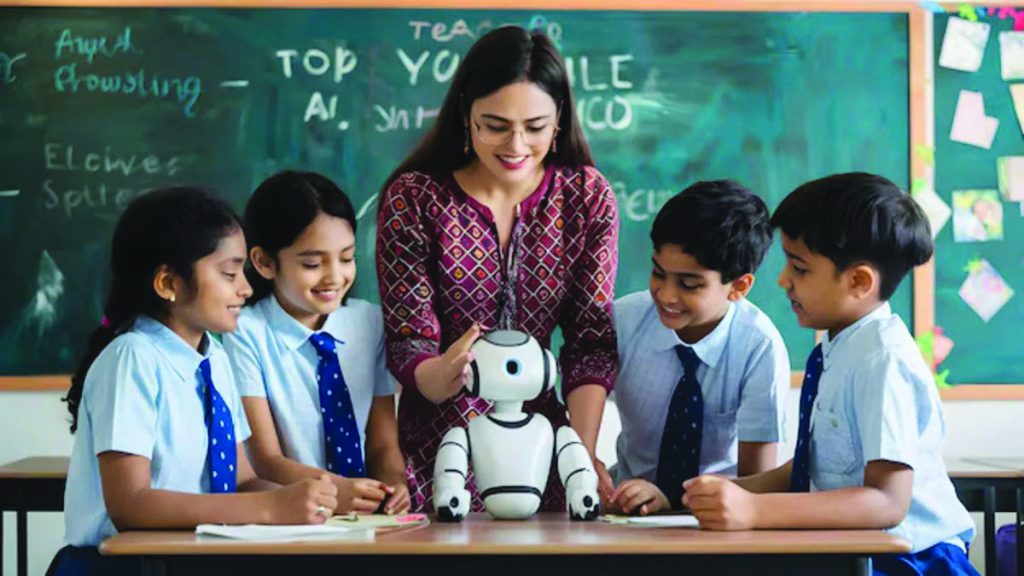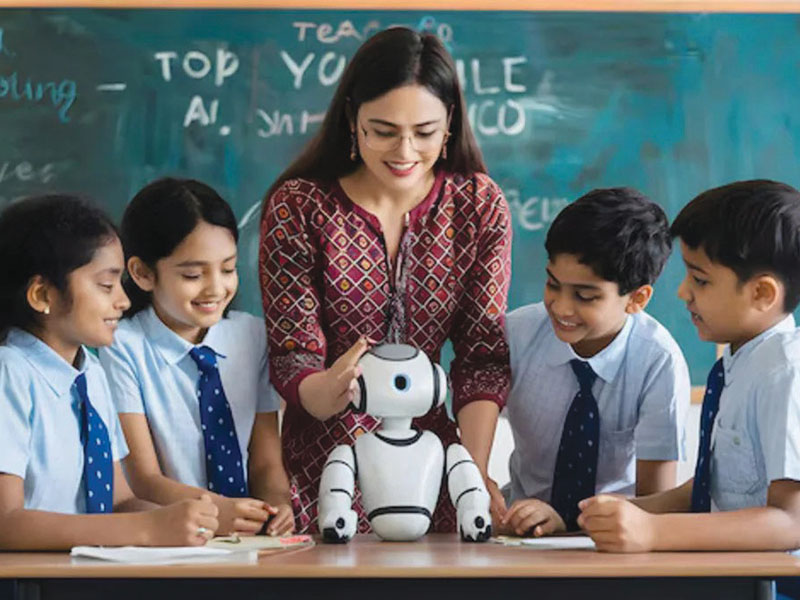Delhi: Running before walking initiative
– Kaveree Bamzai (Delhi)

AI experiential learning. Inset: Dr. Karthik Raman
With the generative ai (artificial intelligence) boom having captured the imagination of businessmen, politicians and educators worldwide, even lackadaisical bureaucrats in New Delhi seem to be climbing aboard the fast-rolling AI bandwagon. A new directive dated October 30 of the Union ministry of education says that AI and Computational Thinking (AI & CT) will be introduced in all schools from class III onwards in the academic year 2026-27.
An expert committee chaired by Dr. Karthik Raman, professor in the department of data science and AI at IIT-Madras, has been constituted to develop the curriculum in coordination with the Central Board of Secondary Education (CBSE) and National Council for Educational Research & Training (NCERT).
Although this initiative is trendy and contemporary, several experienced educators believe that it’s a premature over-the-top initiative. The Annual Status of Education Report (ASER) 2024 published by the authoritative, independent Pratham Education Foundation reports that although nearly all 14-16-year-olds have access to smartphones, only 57 percent use them for education purposes, compared to 76 percent for social media. Meanwhile over half the children in classes III and V in rural India can’t read class II texts and solve simple multiplication and division sums. Therefore introducing class III children to AI-CT, when they can barely read or write, may be too big a leap of faith.
“It all depends on curriculum design. With that caveat, I believe that children are voracious learners and learn best experientially. If the proposed curriculum includes interactive AI sessions and games, where children can tinker, they will learn. The easiest way to kill their interest, curiosity and our society’s future, would be to make this exciting initiative boring by choosing pedagogy over experiential learning,” says Tanuj Bhojwani, former head of People +ai, a Bengaluru-based company promoted by IT maven Nandan Nilekani.
It’s also pertinent to note that the Union education ministry’s proposal to start teaching youngest children AI & CT comes at a time when there is a pushback against digital classrooms. In the West, some celebrities, including Hollywood actor Hugh Grant, believe that screen-obsessed schools are ruining education and that laptops and tablets should be banned from schools. According to a 2023 report of the Department for Education in the UK, 98 percent of teachers use technology in a wide range of classroom activities with laptops and tablets now available to more than 90 percent of pupils in primary and secondary schools.
Grant is supported by Prof. Jonathan Haidt, author of The Anxious Generation: How the Great Rewiring of Childhood Is Causing an Epidemic of Mental Illness (2025). Haidt’s book traces how “play-based childhood” began to decline in the 1980s, and has been wiped out by the arrival of “phone-based childhood”. Haidt presents more than a dozen examples of how this “great rewiring of childhood” has interfered with children’s social and neurological development, prompting sleep deprivation, attention fragmentation, addiction, loneliness, social contagion, social comparison, and perfectionism.
These apprehensions are magnified in India where the majority of government schools which grudgingly host 52 percent of in-school children, are defined by crumbling buildings, ramshackle if any labs, lack toilets, drinking water and often electricity. According to the Union government’s Economic Survey 2024-25, 43 percent of India’s 1.47 million schools are bereft of computers and 46 percent don’t have internet access.
Comments Prof. Venkatesh Balasubramanian, professor in the department of engineering design, IIT-Madras: “AI is a tool for conducting voluminous research which is not required of school children. Introducing these tools too early can have an adverse impact on the cognitive development of children”.
Typically, instead of addressing the basic problems of K-12 education — non-existent if not decrepit infrastructure, chronic teacher absenteeism in government schools, obsolete syllabuses, ill-trained teachers — mandarins of the education ministry are drawing up plans to teach children to run before they are readied to walk.

















Add comment